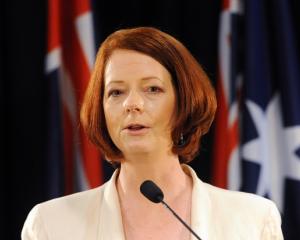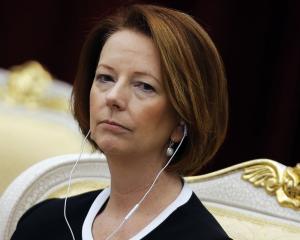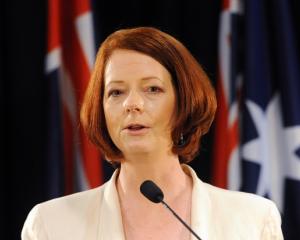The campaign leading up to today's Australian general election has been fought determinedly at the shallow end of the political pool.
If ideas were water wings and policies lifejackets, the two main players would by now be drowning, not waving.
For the campaign, watched from afar, has been singularly bereft of illustrious notions.
Instead, it has been primarily about personality and performance: the man in the "budgie smugglers" versus the carefully coiffured redhead.
Together they have engaged in an unseemly stampede for the middle ground - in a focus group-directed frenzy to offend the least number of voters for as much of the time as possible.
The campaign has been described as "presidential"; but this surely refers to style rather than content and dignifies a rather less salubrious reality: that it has contained about as much substance as a sandpit.
After five weeks on the election trail, there appears little to choose between the two candidates, Labor leader and Prime Minister Julia Gillard, and Liberal-National Coalition leader Tony Abbott - and their policies.
This is an extraordinary achievement.
She is a union lawyer from the left of the Labor Party, childless, unmarried, an avowed atheist, and a fiercely articulate performer in the bear-pit of the parliamentary politics.
He is an ultra-conservative, Catholic family man with three daughters, and a bloke's bloke with a penchant for engaging his mouth before his brain is fully in gear.
If ever two candidates were matched to spark off each other and set a campaign alight, it was these two.
They should have presented clear choices to the electorate at both political and personal levels.
On election day, as the country goes to the ballot box, they remain neck and neck in the polls, with precious little demarcation.
If anything has shaped as an outright winner on the day, it is the ascendant tendency towards managed, two-tone worship at the altar of ideological indifference.
The campaign has been about not making mistakes, about giving away as little as possible of policy detail, and certainly not straying from the mainstream.
Ms Gillard came to office, as has been well-canvassed, through a brutal if bloodless party coup; her predecessor Kevin Rudd, having alienated a number of his cabinet colleagues and insulted and ignored the party's backroom movers and shakers, and much of the electorate as well, was not so much mugged in the murky and famously labyrinthine back alleys of Australian Labor politics as stabbed through the heart in a dramatic, all-but-televised face-off, by his formerly loyal deputy.
The new Prime Minister has had to acknowledge that if Mr Rudd was dumped for his policies then she was in no small part responsible for them.
As soon as she was in office she began to display her pragmatism by revisiting the mining tax that had landed the Government in such trouble; she was less forthcoming on another reversal, emissions trading.
Labor under Ms Gillard still believes in climate change; it just does not seem to know what to do about it, or is not prepared to say.
The jury is out on the nationwide state-owned broadband network - hated by opponents of "big government" - but which policy predates the Prime Minister's leadership anyway; neither has there been any definitive dictates on the great bogey of contemporary Australian politics - the incoming tide of boat people - other than non-specific undertakings to halt it.
For his part, Mr Abbott has gone toe-to-toe with Ms Gillard in a battle of the policy blands, equally refusing to be drawn into controversial areas.
He has consistently denied the Coalition has any intention - "not now, not ever" - to reinstate the Howard government's unpopular Work Choices industrial legislation.
While rightly criticising the Prime Minister over wasteful initiatives - housing insulation and education infrastructure - introduced by the Government in response to the global financial crisis, he has refused to debate with her over economic policy and direction.
Abetted by the lack of a credible shadow treasurer, this has done little to assuage Labor taunts of Mr Abbott's economic illiteracy.
As a point of difference, against Labor's national broadband network, his party has put up 26 weeks of paid parental leave, slim pickings on which to elect a government, especially when the line-up behind him has been so anonymous.
Mr Abbott's chief achievement in this campaign has been to trump the generally low expectations with which he went into it.
He has surprised many observers, casual and seasoned, with his personal performance.
Today, Australians are compelled by their electoral law to vote.
The choices remain less than stark, the beliefs of the prime contenders somewhat opaque.
This will make the task unenviable - particularly for the floating voter.
Faced with an increasing dearth of conviction politicians, and a paucity of genuine political ideas, it might be expected that this is a burgeoning constituency.
And while the party leaders and their strategists might be criticised for devising such a colourless campaign, the media, too, will have some cause to reflect on its part in this whole uninspiring affair.






